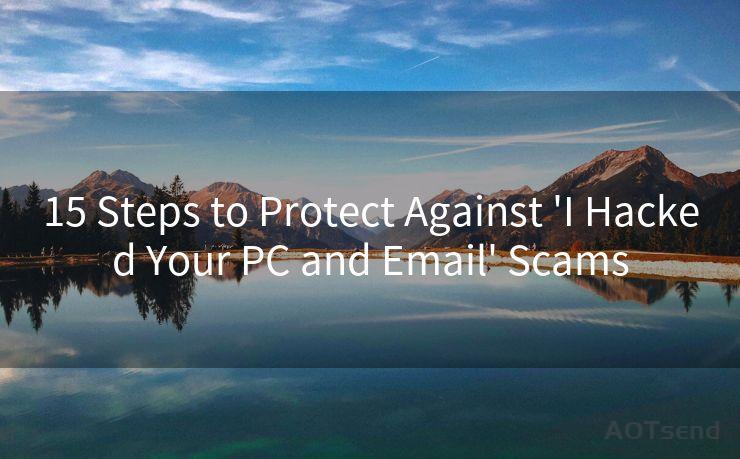15 Steps to Protect Against 'I Hacked Your PC and Email' Scams




In the digital age, scams are becoming increasingly common, with one particularly nasty variety being the 'I Hacked Your PC and Email' scam. These scams often involve receiving an email from an anonymous sender claiming to have hacked your computer and email, and demanding payment to prevent the release of sensitive information.幸运的是, there are steps you can take to protect yourself from these scams. Here are 15 essential tips to keep you safe:
1. Don't Panic
The first step when receiving such a threat is to remain calm. Panic can cloud your judgment and lead to rash decisions.
2. Verify the Source
Always check the email address and other identifying information to confirm the sender's identity. Scammers often use spoofed email addresses.
3. Don't Respond Directly
Never reply to the scam email or engage with the scammer. This only confirms your email address as active, potentially leading to more spam or scam attempts.

4. Change Your Passwords
Immediately change your email and other important account passwords. Use strong, unique passwords for each account.
5. Enable Two-Factor Authentication
Adding an extra layer of security, two-factor authentication requires an additional verification step, making it harder for hackers to access your accounts.
6. Scan for Malware
Run a full system scan using trusted antivirus software to detect and remove any potential malware that may have been installed.
7. Backup Your Data
Regularly back up all important data to an external hard drive or cloud storage. This ensures data recovery in case of a breach.
8. Update Your Software
Keep your operating system, browser, and all other software up to date. Outdated software can have vulnerabilities that hackers exploit.
9. Use a VPN
When using public Wi-Fi, a Virtual Private Network (VPN) adds an extra layer of encryption, protecting your data from prying eyes.
10. Be Cautious With Links and Attachments
Never click on links or open attachments from unknown sources. These can contain malware or lead to phishing sites designed to steal your information.
11. Educate Yourself
Stay informed about the latest cyber threats and scams. Knowledge is your best defense against these attacks.
12. Report the Scam
Report the scam to your local authorities and the relevant internet security organizations. This helps them track and shut down these operations.
13. Monitor Your Accounts
Regularly check your bank and credit card statements for any unauthorized transactions.
🔔🔔🔔
【AOTsend Email API】:AOTsend is a Managed Email Service for sending transactional emails. Support Email Types: reminders, authentication, confirmations, notifications, verification codes, invoices, password resets, account activations, billing statements, two-factor authentication (2FA), and one-time passwords (OTP) emails, etc. $0.28 per 1000 Emails. 99% Delivery, 98% Inbox Rate.
You might be interested in:
Why did we start the AOTsend project, Brand Story?
What is a Managed Email API, How it Works?
Best 25+ Email Marketing Platforms (Authority,Keywords&Traffic Comparison)
Best 24+ Email Marketing Service (Price, Pros&Cons Comparison)
Email APIs vs SMTP: How they Works, Any Difference?
14. Use Credit Cards Wisely
When making online purchases, use credit cards instead of debit cards or direct bank transfers. Credit cards often offer better fraud protection.
15. Spread the Word
Inform your friends and family about these scams. Awareness and education are key to preventing these attacks from succeeding.
By following these 15 steps, you can significantly reduce your risk of falling victim to 'I Hacked Your PC and Email' scams. Remember, prevention is always better than cure. Stay vigilant, stay safe!




Scan the QR code to access on your mobile device.
Copyright notice: This article is published by AotSend. Reproduction requires attribution.
Article Link:https://www.mailwot.com/p1852.html



